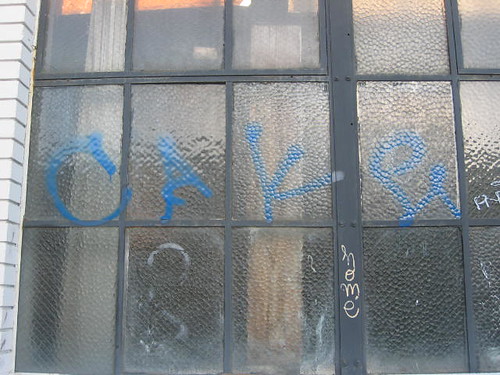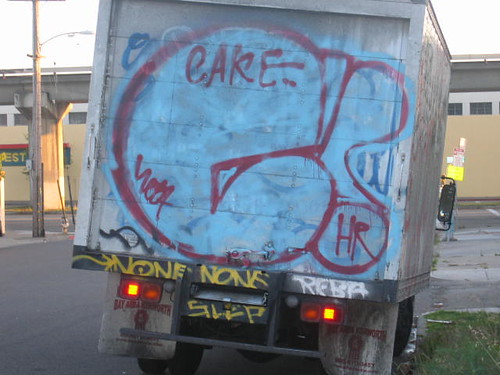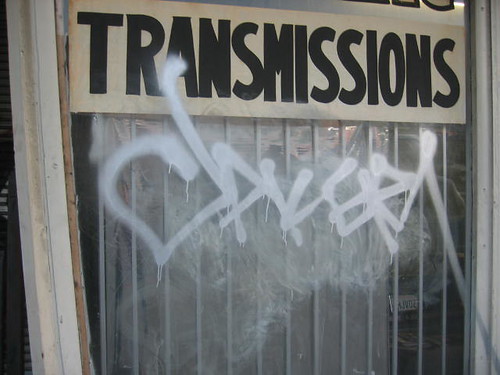we think about it all the time, we myopically scrutinize our interactions, we project our fears onto others, we talk about it obsessively outside of work, we put everything we have into it and expect everything out of it and when things stall we are frustrated outside of proportions. Or maybe that's just me.
(as I said this morning)
You empower someone in certain ways when you call them chef. In places I've worked the savory chef has always been chef but as much a token of otherness as a gift of respect. You do not do what I do. You are not on my team, though we are all together. Calling the leader of your lil pastry world Chef is a different and more meaningful enterprise. In culinary school our chef of course wanted to be called Chef, but since there were seven of us fierce neophytes and one of him, we eventually all bonded past the point of professionalism (wine with lunch, discussion of sex lives, forays into cured meats, etc, going to a bar after class). Then we began calling him Cheffy. Now he works at least 80 hours a week teaching classes of 20 and probably no one calls him Cheffy, that mixture of respect jostled by familiarity and friendship.
Until now, every other boss I've had has been a first-name basis. Is it coincidental that I did not respect them (with the exception of Maura)? When you let someone be your chef (as opposed to your boss, or your colleague), you give them that power over you and it's a power that people not in kitchens don't seem to understand. I've named characters Chef in stories and had people question me: I Don't Understand Why Everybody Calls Her Chef. Surely She Must Have A Name. Her Best Friend Would Call Her By Her Name.
Not If She's The Sous Chef.
At the cupcake shop, my boss took everyone to see Ratatouille, and she took all the FOH and BOH staff out to dinner (I managed to miss all of the above for various reasons). One of her employees house-sat for her, hung out socially with her, and got rides home all the time. This one was the clear favorite and she even got paid more than anyone else {don't ask how we knew this; secrets will out themselves}. My FH boss invites me for holiday dinners, but she doesn't supervise the work I do or even necessarily know what items I'm working on unless I tell her. She even wants to call me the pastry chef but I don't claim that title because I think it's silly to have a part time pastry chef. To give someone all of the nominal prestige but no hours, limited ingredients, and six hours of prep time in a work week.
It's an underground hierarchy and when you title someone your chef it gives you both certain roles. It's unsettling and feels dangerously foolish sometimes to slip out of that boundary and address your chef by their real name. You know it's a bad idea. But if you are not at work, you're not sure why. If your chef is before you and you are not in a kitchen and you are not wearing whites, what rules apply? I did not call my chef "chef" when were in the same social scene for a while this past weekend. But I did introduce myself to her friend by saying: Hi I'm Lindsey I Work For... Which is such a conditional identity, but seemed the most appropriate thing to say.
You get used to it, the hierarchies of the kitchen. You learn the patterns. Last night the sous chef was telling one of my coworkers to stock up the kitchen with supplies. I was cutting cake rounds...and cutting things evenly and in straight lines is not my strong suit, so I was trying really hard to be slow and careful {it's sad but true, I am not joking. My old boss used to yell at me all the time for not being able to cut a cake in 12 even pieces, but no one in my family has good spatial perception}. So my coworker would come back with 2 pots, and then mill about back to other other project. We'd say, no, look for the ladles, make sure we have enough containers. You learn to see what a kitchen needs. Each time she left we'd call out additional items after her: Sheet Pans! Half Sheets! Spatulas!
This is often how you learn in the kitchen: People tell you, and tell you, until you learn to see. Sometimes learning to see means you have to say No I Don't See How That Is Different. And then looking again and again until you can see it.
For anyone in the Bay looking for sahlab root--as opposed to sahlab powder, and if you want to know the difference you may certainly ask--I asked at Samiramis yesterday when I was buying basturma for work. They used to stock it...but few people bought it so they stopped. I asked if they'd get some if I wanted some. If my job wanted some. The owner did not say yes exactly, but he seemed to indicate he'd consider it. He told me it would be expensive, about $3/oz. But I think the Oleana people paid $100 for a pound! So that seems not expensive to me. Sahlab, I want it. Perhaps if there are enough of us, we can acquire it.
Tuesday, October 23, 2007
you might think the boundaries of the kitchen end outside the door
Labels:
business of being a chef,
frog hollow,
sahlab
Subscribe to:
Post Comments (Atom)
.jpg)

















2 comments:
Lindsay,
You will learn that many people in the industry google folks before considering them for a job. Anyone seeing how poorly you speak of your previous (well respected) employers will most certainly think twice about hiring you. Remember, you won't be at your current job forever, you should be using your blog as a way to exemplefy just how great you think your work is as well as how well you respect others. You're digging yourself a big hole and all of your words (in this big digital age) are fair game for hiring.
I know that if your resume comes across my desk, all of this baggage certainly comes along with it!
Wow. Y'know, anonymous, this post does not actually mention any specific employers of mine by name except for one. And if you spend time reading this blog you will see time and again that I love that job. That love aside, not everything about it is perfect and that has a right to be documented.
Unless you are the person who yelled at me weekly for being unable to cut a cake in equal pieces, or my former employer who gave my colleague a "secret raise" then you do not know who or where or when I'm talking about, do you?
There are a lot of bad employers and a lot of good employers and I am not in this to "out" anyone for being a bad employer or to tell anyone's dirty secrets. If I mention by name a place I worked at it is usually to describe how a process was done at that place not to say, oh ___, they were so terrible. So you might want to do a little more digging for yourself before you jump to conclusions.
Any my current boss, by the way, the one I refer to as "chef" in this post? She reads my blog.
Post a Comment